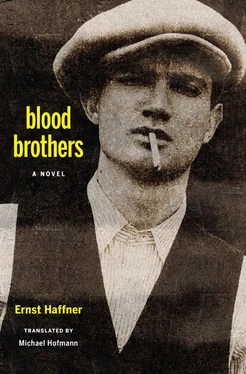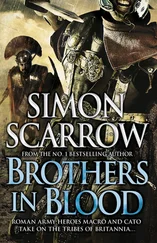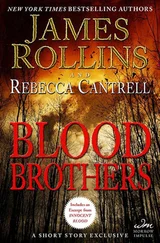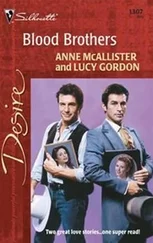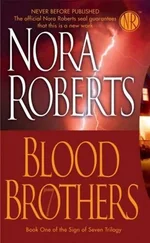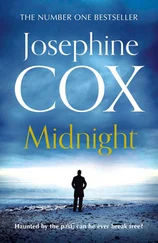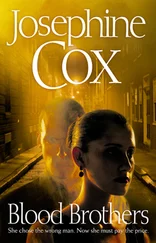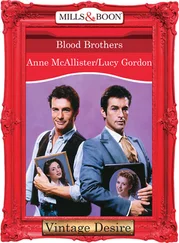In the late afternoon, the boy takes him to a big building in Köllnischer Park. The doorman gives them a number, and tells them to wait in the back building. In a room, there are up to hundred boys and men, sheepish or shit-eating grins on their faces. Lads from sixteen to twenty make up the majority. When Willi’s number is called, a nurse leads him to an office, where a case register is started for him. “What name shall I put down?” Willi hesitates. “I don’t want your actual details, I just need a name to put on the file,” the official says. “Okay, Schröder,” says Willi. He is given a little gray card: State Insurance: Berlin. Medical department C., for Herr Sch. , and is taken to a huge white room that is divided up into separate treatment areas by moveable partitions. In every cell is a desk, an examination chair and other medical equipment.
A doctor inspects Willi. “Where did you get your infection?” Willi is silent. “Are you able to identify the party so that we can have them taken to a doctor?” What’s he going to say, is he going to betray Elly? No, he’ll send her along in person. “I don’t know the girl’s name … we met at the fairgrounds … don’t know her address neither.” MP — name and address of suspected party unknown , the doctor writes on the patient sheet under the rubric “source of infection.” “MP” stands for multiple partners. The abbreviation tends to be used with persons suspected of being involved in prostitution. The doctor calls a nurse into the room: “Would you take a blood sample, just in case.” The blood taken from Willi’s left arm will be sent to a laboratory and subjected to a Wassermann test. In three days, Willi will be told whether, in addition to gonorrhea, he has been given syphilis by Elly as a memento.
Along with the transfer note for a treatment center, Willi is given a little booklet on sexually transmitted diseases. It contains the endlessly sagacious sentence: The only dependable protection from sexually transmitted diseases is the avoidance of all sexual activity before marriage.
DURING LUDWIG’S TIME IN CHOKEY,lots of things have changed in the gang. All the boys have got new clothes. A few, Fred, Jonny and Hans, have new wardrobes from head to toe, with good suits and even winter coats. There’s money sloshing around as well. Jonny straightaway organizes a collection for Ludwig among the Brothers. “To help him forget his time inside.” Ludwig is presented with forty-two marks. He is to buy himself a coat with the money, and various bits and pieces he needs. On the evening of the day Ludwig made his successful break for freedom, there is a big pub crawl in his honor. All the boys are really glad to have him back. And the fact that he ran away so fearlessly in an underground station, that lifts him up a peg or two in everyone’s eyes. While the geezer who gave Ludwig the stolen luggage chit, he’d better count his bones if they ever catch up with him. The meanness. When he could have just gone up to him and said: “Hey, this is a stolen ticket. Do you want to pick up the suitcase? We’ll go fifty-fifty.” That would have been appropriate, but this … He’d better watch it!
Ludwig is worried about showing up at so many bars in one night. It would just take one little raid in one of them and he’s in shtook, seeing as he’s got no papers. Papers, papers … Jonny muses. Then: “Come with me.” They head over to Grenadierstrasse, Berlin’s ghetto, the street of the little illicit businesses and dives. Jonny exchanges a few words with an old Jewess standing by a cellar opening. She calls a boy up out of the cellar and sends him off on an errand. After a few minutes, he returns with a little wrinkled-looking Jew in a greasy kaftan. The old man’s beard and hair are a greenish tangle, his small eyes peer restlessly this way and that. The Jew takes Jonny and Ludwig into his shop.
The term “shop” is a wild exaggeration. You could purchase its entire stock and have change from ten marks. A few venerable biscuits, the inevitable garlic, a few packets of kosher margarine. The shop is just a blind anyway, a mask for other, better lines of business that don’t need stock. They go into a dark windowless back room. The Jew sits down between Ludwig and Jonny on an erstwhile sofa. Devout, submissive and innocent, the old fence folds his black-veined hands together. “What are the gentlemen looking for?” “My friend here needs papers,” begins Jonny. “Papers … oh …” Straightaway, the old man becomes suspicious and reserved. False papers are a difficult business. Jonny is offering fifteen marks for a police registration certificate or an unemployment card. The old man’s fingers are playing nervously with his kaftan, fear and cupidity are in equipoise. No, he doesn’t do papers. He is an honest man. Yes … But … he knows someone who does do that sort of business. “What are we waiting for, then? Let’s go see him,” Jonny interrupts.
The someone turns out to be an ancient wizened old woman on the fourth floor of a back apartment. First off, the old man has a big powwow with the little lady. A grisly mix of Yiddish, Hebrew and German. Then the old man explains to Jonny and Ludwig in a lachrymose singsong that someone had lived here, he was registered with the police and everything was in order. But one day he hadn’t come home, and had thus cheated the honest old lady out of her rent money. The only things he had left behind were a soiled shirt and a bunch of papers in a cigar box, including police registration, his tax card and a baptismal certificate. “Let’s see ’em,” says Jonny. The registration is made out for the flat on Grenadierstrasse, and is in the name of August Kaiweit from Königsberg, born in 1908. Now, Ludwig was born in 1912, and as a native of Dortmund he has barely heard of Königsberg, but in general the papers are not bad. “Where did the man live?” Jonny asks. The old lady takes him to a wretched closet. “Rent?” “Five marks a week.” “And the papers?” Once again, the two old people fall into an endless back-and-forth, incomprehensible to Jonny and Ludwig. Result: ten marks for the papers, and five marks commission for the old Jew.
Done. Jonny gives the old lady ten marks for the papers, and five marks’ rent down on the first week; the Jew is paid his commission. Ludwig has got himself a new name and new digs, in one fell swoop. Now, August Kaiweit need have no fear of police raids. Admittedly, the papers wouldn’t work at police HQ, where they’ve got Ludwig’s prints and photographs on file. Moreover, it’s not impossible that the real August Kaiweit has a police record and is on some wanted list somewhere. Perhaps he’s even a crook; in view of these dodgy Grenadierstrasse digs, that’s even quite likely. But there it is: if Ludwig was risk averse, then he might as well hand himself over to the police. A life outside the law is not the same as shelter in the bosom of Abraham …
He takes the front-door key from the old lady, and leaves with Jonny. On Münzstrasse there is the parting of ways. Ludwig to look for an old coat from a dealer, and Jonny … Jonny has something to go to that involves Fred. Them and their secrets, thinks Ludwig. Rendezvous: eight o’clock at the Rehkeller on Prenzlauer Strasse, just up from Alexanderplatz.
Alexanderplatz! The focal point of Berlin’s underworld. Familiar — who hasn’t seen the movies? The aristocratic gangsters, who won’t do a job except in top and tails. Those sinisterly beautiful evildoers, for whom murder is a perverse hobby. And the beautifully realistic criminal cellars with Apache dancers, Brylcreemed villains, classy two-mark whores with fire-red mops of curls. The discreet champagne lounges in the basements, and the trapdoors. All provided by the glib and deficient imaginations of directors and other second-raters. The amusement industry clamors for the like. It wants cheap thrills for its expensive balcony seats. So the criminal underworld’s the thing. And because the social misery of the actual underworld is not the kind of thing Kurfürstendamm pays money to see, Berlin is given a fictitious one instead, one which, as above, lives in the lap of luxury. The superficial observer of this falsified milieu would find Berlin’s actual criminal underworld deathly dull. Nothing of interest there, nothing. Blood is a precious liquid, here as there, and Berlin’s villains go to admire the demonic super-criminal in the same place as everyone else — the cinema. It needs closer study to get through to those people who, between brief spans at large, measure out their lives in long prison sentences, in constant flight from the law, and — after a few days of joy, vegetate in ever-deeper deprivation.
Читать дальше
